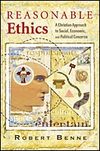Why should we even bother to pay attention to what the Pope says? I can hear that question being asked by some of my earnest Lutheran friends. Well…let’s see….other than the fact that Pope is the spiritual head and chief teacher of the world’s largest group of people who claim to be Christians, I can’t think of a good reason to pay attention to what he has to say. Here is a good summary of Pope Benedict’s first encyclical.
Link: BREITBART.COM – Pope Warns About Loveless Sex.
Pope Warns About Loveless Sex
Jan 25 10:35 AM US/Eastern
Email this storyBy NICOLE WINFIELD
Associated Press WriterVATICAN CITY
Pope Benedict XVI warned in his first encyclical Wednesday that sex without unconditional love risked turning men and women into merchandise.
In the 71-page document “God is Love,” Benedict explored the relationship between the erotic love between man and woman, referred to by the term “eros,” and the Greek word for the unconditional, self- giving love, “agape” (pronounced AH-gah-pay).
He said the two concepts are most unified in marriage between man and woman, in which a covetous love grows into the self-giving love of the other, as well as God’s unconditional love for mankind.
He acknowledged that Christianity in the past has been criticized “as having been opposed to the body,” _ the erotic form of love _ “and it is quite true that tendencies of this sort have always existed.”
But he says the current way of exalting bodily love is deceptive.
“Eros, reduced to pure ’sex’ has become a commodity, a mere ‘thing’ to be bought and sold, or rather, man himself has become a commodity.”
“Here we are actually dealing with a debasement of the human body: no longer is it integrated into our overall existential freedom; no longer is it a vital expression of our whole being, but it is more or less relegated to the purely biological sphere,” he said.
Benedict explored the two aspects of love to then explain how the Roman Catholic Church’s charitable activities are based on love and are a fundamental part of its mission. He said the church had no desire to govern states, but at the same time couldn’t remain silent in political life because its charity is needed to ease suffering.
The encyclical, eagerly watched for clues about Benedict’s major concerns, characterizes his early pontificate as one in which he seeks to return to the basics of Christianity with a relatively uncontroversial meditation on love and the need for greater works of charity in an unjust world.
Even Vatican officials have expressed surprise at the topic, considering Benedict was the church’s chief doctrinal watchdog and could easily have delved into a more problematic issue such as bioethics in his first authoritative text.
In the encyclical, Benedict said the church’s work caring for widows, the sick and orphans was as much a part of its mission as celebrating the sacraments and spreading the Gospels. However, he stressed that the church’s charity workers must never use their work to proselytize or push a particular political ideology.
“Love is free; it is not practiced as a way of achieving other ends,” he wrote.
“Those who practice charity in the church’s name will never seek to impose the church’s faith upon others. They realize that a pure and generous love is the best witness to the God in whom we believe and by whom we are driven to love.”
He rejected the criticism of charity found in Marxist thought, which holds that charity is merely an excuse by the rich to keep the poor in their place when the wealthy should be working for a more just society.
While the Marxist model, in which the state tries to provide for every social need, responded to the plight of the poor faster than even the church did during the Industrial Revolution, it was a failed experiment because it couldn’t meet every human need, he wrote.
Even in the most just societies, charity will always be necessary, he said.
“There will always be suffering which cries out for consolation and help. There will always be loneliness. There will always be situations of material need where help in the form of concrete love of neighbor is indispensable,” he said.
Benedict stressed that the state alone is responsible for creating that just society, not the church. “As a political task, this cannot be the church’s immediate responsibility,” he said.
However, he said the church wants to help “form consciences in political life and stimulate greater insight into the authentic requirements of justice as well as greater readiness to act accordingly, even when this might involve conflict with situations of personal interest.”
He said the church was “duty-bound” to offer such a contribution, and that the lay faithful, who as citizens of the state, are duty-bound to carry it out through works of charity.
“We do not need a state which regulates and controls everything, but a state which … generously acknowledges and supports initiatives arising from the different social forces and combines spontaneity with closeness to those in need,” he wrote.




